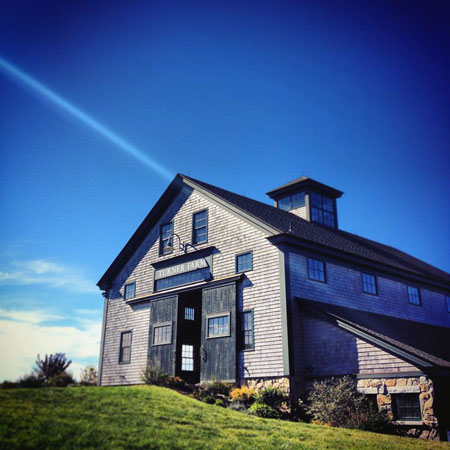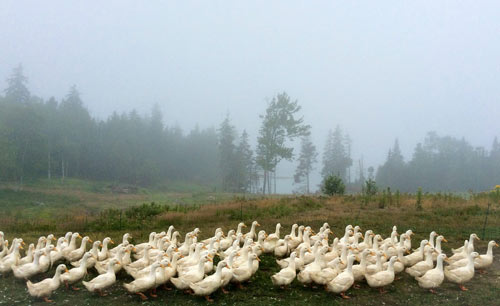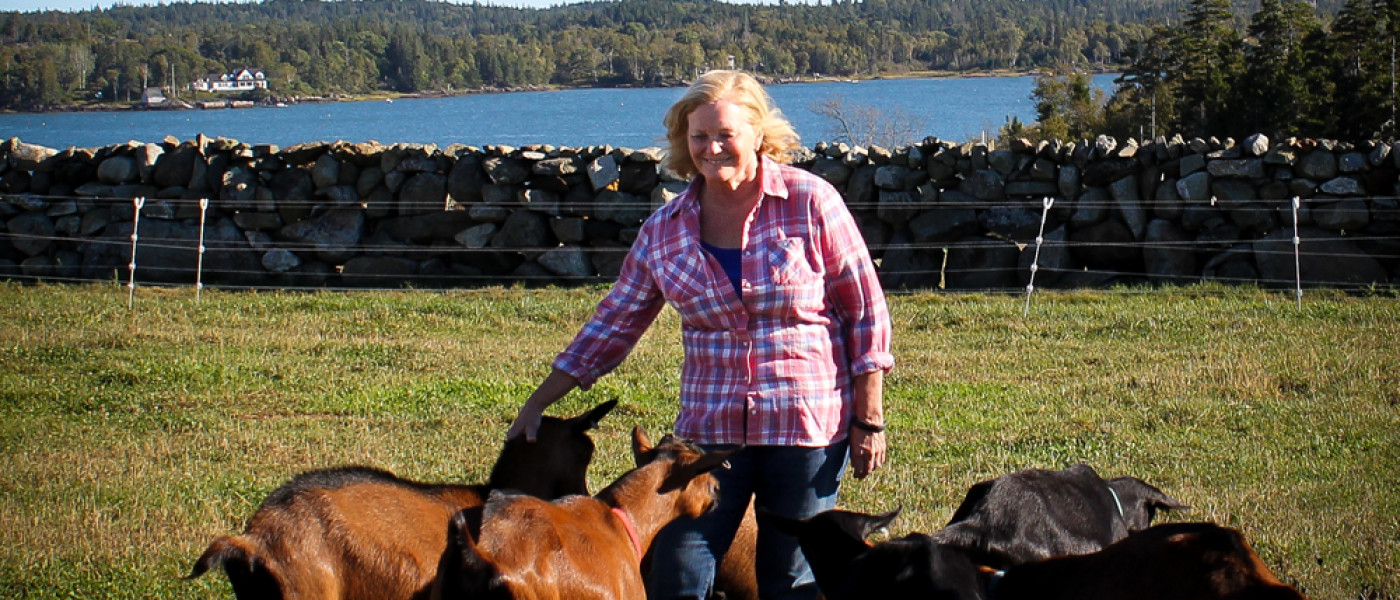“The business of procuring the necessities of life has been shifted from the wood lot, the garden, the kitchen and the family to the factory and the large-scale enterprise. In our case, we moved our center back to the land.”
Pingree’s life today is what she calls “a far cry” from her simple life then. She still farms on the island of North Haven, but these days her farm, Turner Farm, sits on 200 acres of beautiful saltwater farmland. The farm raises vegetables, goats for dairy, and beef cows, pigs, chickens, ducks, and turkeys. Turner Farm’s vegetables, flowers, poultry, herbs and eggs are certified organic by Farm Aid partner Maine Organic Farmers and Gardeners Association (MOFGA). Turner Farm also operates its own poultry processing facility, guaranteeing the freshest cuts for their direct to market retail. The farm supplies produce to the restaurant at Nebo Lodge, the family’s cozy inn managed by one of Pingree’s daughters. With help from two farm managers, a livestock manager, a cheesemaker, a couple of property overseers, and seasonal apprentices in the growing season, Turner Farm is remains a fully functioning farm that Pingree can enjoy returning to while on recess from Congress. When she comes back to Maine, she’ll pitch in with poultry processing, put on a weeknight dinner in the barn, take a turn behind the bar, and more—wherever she’s needed.

Though her full time job representing Maine in the House of Representatives doesn’t allow her to be as hands-on at the farm any more, Pingree’s double life as a farmer and a congresswoman has crossover that benefits farmers, eaters, and lawmakers alike. “When we’re discussing policy in Washington, I can say ‘I know a lot of small farmers or I know this particular experience,'” Pingree explains. “We had a hearing today with the FDA about the Food Safety Modernization Act and I talked a little bit about the future irrigation rules—how often a farmer should have to test their water, something that I know first hand.” This intimate knowledge of farms and food led Pingree to serve on the Agriculture Committee (2009-2012) and the Agriculture Subcommittee of the Appropriations Committee (2013-present), lending her authentic farmer voice to discussions on our systems of agriculture.
In the lead up to the reauthorization of the last farm bill, Pingree proposed the Local Farm, Food and Jobs Act. The final 2014 Farm Bill put into law contains many of the reforms proposed by Pingree, including programs that make it easier to use SNAP benefits to purchase local food, funding to promote farmers markets and farm stands and to assist farmers transitioning to organic agriculture and local food production, and reform in federal crop insurance programs that work better to protect organic and diversified farms. In her work as a member of the House Appropriations Subcommittee on Agriculture, Pingree is working to make sure that farm to school programs get the support they need to feed students good food while supporting local farmers.

Pingree knows that the challenges of operating a family farm in our current system of agriculture are numerous, and these farms have been disappearing across our nation for years. “In the town I live in, there were 79 farms in the 1860 census… Maine used to be covered with farms; most of them are gone,” she explains. Among a growing list of challenges lies the truth that for a lot of these farmers, the greatest is about basic capital. “It’s very hard for farmers to borrow money—it’s a high risk business—a lot of people get into this with just their own sweat and labor, not with big equity behind them or big bank accounts to start out. It’s often just finding those resources.” This rooted understanding of the challenges that family farmers face is why Pingree has raised her voice on their behalf through her work in Congress.
It can also be difficult for farmers to find the time to market their products successfully, and find the fair price they need. Another challenge is to boost involvement in farming among the younger generation. Even if young people have interest in farming, Pingree explains that it’s hard to find opportunities for them to break into the industry. “You may have young people wanting to get into farming that didn’t grow up on a farm, but have interest in it. Luckily in Maine, we have farm training and apprenticeships (like the ones at MOFGA) and other opportunities for people to learn from other farmers, but that in itself can be a real challenge in some communities.”
Regardless of these challenges, Pingree sees hope for farming communities to make the comeback they deserve. “We have to support all levels of agriculture, and make sure we’re creating all the opportunities we can for those people who want to have a family farm or stay home in the state they grew up in. I think there are huge opportunities out there for rural economies coming back, for families wanting to raise their kids in a rural area, and for consumers who want to be able to look their farmer in the eye and know how something was grown. They have more of an incentive to ask a lot of questions and choose a quality item.”
Helen and Scott Nearing advocated for a sane and simple life in our troubled world. Today, Congresswoman Pingree wants to preserve our opportunity to live the good life as they did. “Farming is a big part of our history and it’s the most wonderful way to grow up—to be raised in a rural community and grow up on a farm, learn about growing your own food, raising animals. It’s a really important American tradition,” Pingree says, “We can’t allow it to die.”
See more of Congresswoman Pingree on her farm in this campaign video:




